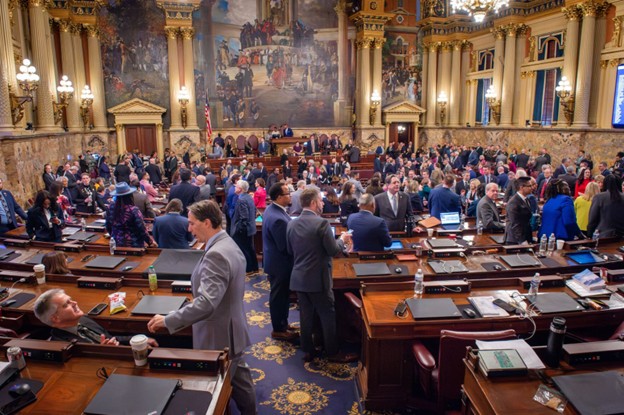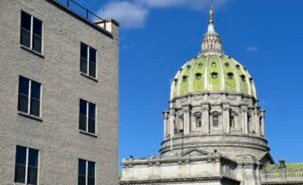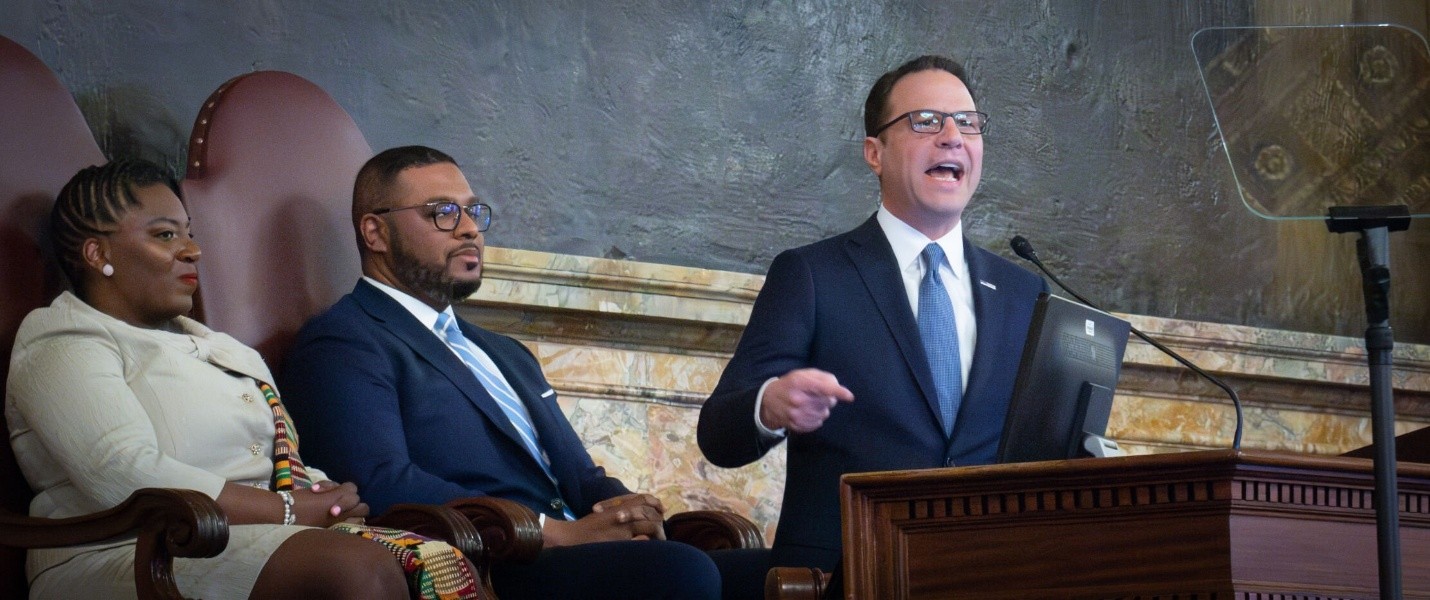Pa. House Democrats pass state budget
Without buy in from Senate GOP

Three Republican Representatives in the House Voted Yea
House Roll Call Vote Summary #597 | 2025-2026 Regular Session – PA House of Representatives
BAD for Pennsylvania > Craig Williams – Voted YEA
House District 160
Represents Chadds Ford Township this township is east of Kennet Square and South of West Chester
BAD for Pennsylvania > Kathleen C. Tomlinson – Voted YEA
House District 18 in Bensalem
Represents part of Bucks County, that is east of Far Northeast Philly
BAD for Pennsylvania > Thomas L. Mehaffie III – Voted YEA
House District 106
Serving Dauphin (part) County that is west of Lebanon but east of Harrisburg and north of Elizabethtown

Pa. House passes budget bill; ‘still much work to do,’ Senate Republicans say
The proposal House Democrats sent to the Senate would cut spending by about $900 million
Two weeks after the state budget deadline, lawmakers and Gov. Josh Shapiro said they’ve made progress in negotiations as the Democratic-controlled House advanced a $50.6 billion proposal to the GOP-led Senate.
It represents about a $900 million reduction in overall spending compared to Shapiro’s $51.5 billion proposal in February, but Republican House leaders said the bill is a largely procedural document and that more work remains to be done.
“This is not agreed to, but we are pleased that talks are continuing, moving in a direction that while it may seem slow and in fact is slow and frustrating for many of us, we do believe that there is some positive momentum,” House Minority Leader Jesse Topper (R-Bedford) said.
The Democratic majority’s lead budget negotiator, Appropriations Committee Chair Jordan Harris (D-Philadelphia), said lawmakers owed their constituents progress.
“The folks have already waited too long,” Harris said, noting that school districts across the commonwealth were forced to pass their budgets without knowing how much state funding they will get. “It is our responsibility to take a step forward, to show them that we’re not only working, but that we are ready to do what is necessary to get them a spending plan.”
The general appropriations bill passed the House in a 105-97 vote with the support of Republican Reps. Thomas Mehaffie of Dauphin County, Kathleen Tomlinson of Bucks County, and Craig Williams of Delaware County.
A spokesperson for Senate Majority Leader Joe Pittman (R-Indiana) echoed the House Republicans’ view that the vote was primarily procedural and said the bill is not “a finished product.”
“Senator Pittman remains very upbeat and is actively engaged in discussions, however there is still much work to do,” spokesperson Kate Flessner said.
After meeting with House Democrats, Shapiro told reporters he had met Pittman and House Majority Leader Matt Bradford (D-Montgomery) and said they had made good progress. He repeatedly declined to discuss specifics of the negotiations or how long it would take to reach a final agreement.
“We all have an understanding of where we need to be on an overall spend, where we can make important investments we all want to make and also be cognizant of our fiscal situation,” Shapiro said.
Asked whether Democrats and Republicans had reached agreements on new revenue proposals, which include taxes on legal recreational marijuana and slot machine-like skill games, Topper demurred, saying his caucus is focused on strengthening the state’s economy.
“We’ve made it very clear that even if we didn’t increase spending a dime moving forward, our budgets in the future are unsustainable without economic growth,” he said.
According to a spreadsheet provided by Harris’ office, the House proposal makes cuts to line items throughout the budget while increasing spending on priorities such as K-12 education, the state university system, the Department of Transportation and state police.
It also would increase Department of Human Services funding by nearly $4.5 billion in the face of federal cuts to Medicaid, which Shapiro said could devastate rural hospitals and nursing homes. The state would be unable to make up the loss in Medicaid funding.
The state Department of Human Services says cuts could result in more than 310,000 Pennsylvanians losing Medicaid coverage over the next decade. Some 270,000 could lose access to marketplace plans or face steep premium increases.
The House proposal would also increase public education funding by $930 million. The General Assembly last year committed to closing what it had identified as a $4.5 billion “adequacy gap” between the state’s wealthiest and highest performing school districts and about 370 under-funded districts.
The Pennsylvania State System of Higher Education would receive a $40.4 million increase, about 6.5% more than last year’s budget. The Department of Environmental Protection would get a $130 million funding increase, or about 5.1% over last year.
The state police would see a $118 million increase. The proposal also includes a $16.3 million increase or 6.5% increase for PennDOT. Shapiro’s budget proposal called to continue a process of reducing the amount of fuel tax and license fees dedicated to the state police to make more money available for highways. That money is not reflected in the general appropriations bill.
The House also passed legislation to increase funding for public transportation by nearly $300 million by increasing the share of state sales tax dedicated to the state’s transportation trust fund. That money is also not reflected in the bill passed Monday.
Departments that would see an overall reduction in funding include:
- The governor’s office at $41 million or 7.4%
- Agriculture at $5.9 million or 1.6%Drug and Alcohol Programs by $1.6 million or 0.4%
- General Services at $16.1 million or 9%
- Health at $28.5 million or 3.3%
- Military and Veterans Affairs at $16.2 million or 2.9%
- Department of State at $3.9 million or 6.8%
- Emergency Management and Homeland Security at $24.1 million 13.9%
- Historical and Museum Commission at $795,000 or 2.1%
The House is scheduled to reconvene for a non-voting session day Tuesday, while the Senate has no session days scheduled until September but could return to session with 24-hours’ notice.

Pa. House passes budget bill with negotiations incomplete and many steps remaining
HARRISBURG — State House Democrats late Monday shoved the overdue 2025-26 state budget process forward a bit by passing a General Fund spending plan that was about $1 billion less than Gov. Josh Shapiro’s original proposal but which both parties agreed was an incomplete product.
The vote came 14 days into a new fiscal year without a state budget in place. No practical effect will be felt by the absence of a budget for at least many weeks. But top Democrats in the House majority said it was time to move the process forward even as closed-door negotiations on multiple items continue.
“This is not a completed product and there are many other steps,” said Rep. Jordan Harris of Philadelphia, chairman of the Appropriations Committee. “The folks have already waited too long.”
The bill that passed the House makes appropriations for the executive, legislative and judicial branches for 2025-26. Including anticipated spending on state-related universities that will be covered by a separate bill, the spending plan totals $50.6 billion, compared to $51.5 billion in spending proposed in Mr. Shapiro’s February budget address.
The biggest spending figure among state agencies remained the Department of Human Services, with the newly passed House bill including $20.6 billion compared to Mr. Shapiro’s original figure of $21.2 billion.
Among the areas in which no final deal has been struck is transit and transportation — a crucial issue in Allegheny County, where Pittsburgh Regional Transit is planning major service cuts if it doesn’t get enough new funding from the state. Asked about that late Monday, Rep. Jesse Topper of Bedford County, the Republican minority leader, said only that “the discussions on transportation are progressing.”
The bill will now go the Republican-controlled Senate for consideration. A spokesperson for Senate Republicans, Kate Flessner, said late Monday they did not consider the House bill in its current form to be a final product.
“While we can’t speak for the House, a procedural process needs to occur while we continue to work to reach an agreement,” Ms. Flessner said.
She added Senate Majority Leader Joe Pittman of Indiana County “remains very upbeat and is actively engage in discussions. However there is still much work to do.”
A key issue for Republicans going into negotiations was the gap between ongoing state expenditures and revenue, with the former exceeding the latter by an estimated $3 billion.
But House Democratic Majority Leader Matt Bradford of Montgomery County, in urging colleagues to vote in favor of the bill Monday, said the state has a $10 billion cushion to work with. He was referring to the $7.4 billion balance in the state’s so-called Rainy Day Fund and a few billion dollars of unspent money in the General Fund.
He also referred to recent federal spending cuts as “unbelievable carnage” whose future effects must be considered by Pennsylvania lawmakers.
Mr. Topper, the top Republican, said in a post-vote press conference that the $50.6 billion amount “is too high and unsustainable.” A top priority in the state’s quest for fiscal stability, he said, should be boosting economic growth.
The vote on the bill was 105-97, with all 102 Democrats in favor. They were joined by Republican Reps. Tom Mehaffie of Dauphin County, Kathleen Tomlinson of Bucks County, and Craig Williams of Delaware County.
First Published: July 14, 2025, 8:18 p.m.
Updated: July 15, 2025, 1:53 p.m.